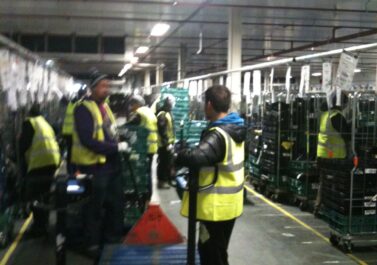Migrant workers: Between Polish and English nationalism
By comrades involved with Workers Initiative (Poland) and AngryWorkersWorld (UK).
We write this short statement in the aftermath of the attack of Polish nationalists on party-goers in Markfield Park, North London on the 21st of June 2014. As witnesses of this event, and as Polish migrants working in London, as well as being involved in working class politics in Poland, we wanted to participate in the discussion related to this attack and general issues related to anti-fascism and nationalism within the working class. [1]
The attack in Markfield Park
The attackers were members of a Polish nationalist group called United Emigrants, which organised a meeting in Markfield Park on the 21st of June. Over the course of the meeting, which took place in some bushes 30 metres from the concert, they got drunker. Nearby there were police who visited the bushes. At 9pm after the police had left, 15 young polish nationalists emerged from the bushes and started provoking the general public, most of them belonging to the ‘squatters’ or DIY subculture. They then attempted to get up on the stage. After a few minutes, the fight started. Around 30 out of about 250 people from the festival took part in the fight against the nationalists – some of them belonging to the Polish (left) subculture. After they managed to push the nationalists out of the park, the police came and divided the two sides. Some of the people from the festival were injured and one Polish man was stabbed. The Saturday evening attack was not the first one. This group is known amongst the local community for a series of muggings and robberies, as well as having organised some meetings previously in the same park, some of which have been attended by over 100 people.
To sum up: we cannot say that the nationalists were able to launch a concerted attack, their behaviour was more characterised by drunken hooliganism. Therefore, also with regards to the fact that it was not their first attack, the response to their provocations could have been more collective and effective on a practical level. On a political level we will have to understand and address the material background of Polish nationalism both in Poland and the UK. The news of this rather haphazard attack made it into the Polish mainstream media and other media across western Europe – we have to understand why.
Political nationalism in Poland and Polish nationalism in the UK
The events of 21st June need to be seen within the framework of the Polish nationalist movement, which in the last 4 years has increased in popularity in Poland. Apart from fighting at various cultural events, e.g. disrupting university lectures given by ‘feminists’ or ‘communists’ of the old ‘communist’ regime, they organise marches and counter-demonstrations, as well as organising attacks on social centres, libraries, and ‘left-wing’ places of interest. Moreover, they set fire to immigrants’ flats, e.g. of Chechens and Roma. They also see themselves as ‘anti-system’, meaning in particular against the government lead by the neoliberal party, PO, from 2007.
Along with the development of nationalist groups in Poland, the model of organisation and ideology has become adapted by Polish ‘immigrants’ over here. On the one hand, we are dealing with more ‘politicised’ groups of nationalists like Polish Youth Associasion Patriae Fidelis. These kinds of groups are more oriented towards recalling the heroes of Polish nationalism, calling upon a bigger, older discourse of political history. There are also some active milieus, similar to United Emigrants, which take the form of affinity groups, inside of which are people that can be classed mainly as hooligans (affiliated to football teams). These groups are less concerned about past political issues, but on the preparation of milieu meetings, being active on the internet through blogs etc. or spontaneous direct action, often under the influence of drink and drugs. When we look at the situation in Poland, the biggest social milieus that created some forms of social organisation (partly) outside of state structures were/are: unions, catholics and hooligans. While Polish migrants reproduce church structures and hooligan associations in the UK, the trade union structures are not transferred.
The material background of the rise of Polish nationalism: Crisis and defeat of working class resistance against restructuring/privatisation
The post-1990 restructuring meant mass loss of jobs in formerly ‘nationalised’ industries, such as the mining industry, shipyards, agricultural industrial enterprises. At this point the nation state as both owner/exploiter and main driver of restructuring/privatisation was the main focus. Most of the struggles against this first wave of restructuring were lost, while during the same period the main trade union, Solidarity (Solidarnosc), became a major conservative force in the political arena. [2] While initially there might have been a hope amongst the working class that the ‘opening of the market’ would compensate for the previous job losses through new investments, after the slump of 2008 this illusion was shattered. [3] At this point, the trade union, Solidarity, helped to transform the social discontent with ‘neo-liberalism’ into a revival of nationalism as ‘protectionism’. This is the core also of the current rise of cultural conservatism.
From 2007 onwards the main ruling party is the neoliberal party PO (Citizen Platform) and the main opposition force against them are the conservatives, PiS (translation: Law and Justice!). PiS, the right-wing opposition, is supported, amongst others, by the trade union Solidarity. During recent years on the local level, Solidarity has cooperated as well with nationalist organisations. On the ideological level, the polish right-wing agree that the country is run by ‘communists’ related to the old regime under the dependency of Russian and western capital. During the last 25 years this union has put a strong emphasis on the struggle against ‘communists’, who, according to Solidarity, use their position in the state apparatus to gain access to state properties (land and industries) in the process of privatisation. They are accused of corruption and of transferring ‘national wealth’ into private hands. At the same time Solidarity asks the government to support ‘Polish businesses’ – meaning that they are not opposed to privatisation, but they want assets to go into ‘national enterprises’.
Alongside the giving up of social demands related to the struggle against exploitation in and outside the workplace, big parts of the official labour movement now focus on the cultural-political field of the right-wing: support of big demonstrations with thousands of people in defence of the catholic television, the demonstrations celebrating Independence Day or smaller marches in commemoration of national heroes. There have also been some attempts to push through more restrictions on abortion law, despite the strict rules governing abortion already. Six months ago, there was leaked information about paedophilia in the Polish church, after which the church attacked feminist activists and the whole discipline of gender studies, calling it ‘genderism’, which according to the church leaders posed a threat to the family and the fabric of society. These are just a few examples of conservative politics realised in parliament, the streets, stadiums and churches, which in no way questions the basis for exploitation in society.
In reaction to violence (hooligans entering the play-field) during a football match in 2011, the Prime Minister banned football fans from attending some important football matches the following weekend. In response, hooligans organised mass protests in various cities. These protests obtained a more general ‘anti-government’ character. From this point, there began an informal alliance between PiS and later on other smaller right wing political parties and the hooligan milieu. The right-wing can portray themselves and their political conservatism as a ‘rebellion’ against the government and as a political force which keep in close contact with ‘the common people’.
It is against this political background that masses of workers from Poland leave the country to find jobs abroad, where again, they have to rely heavily on their ‘national/language community’ to find accommodation and jobs and where they are confronted with nationalist politics, this time targeting them as migrants. Before we describe the situation of migrant workers from Poland in the UK, we have a brief look at why workers have to migrate.
Background of mass migration from Poland
In the last decade, average unemployment in Poland was 14%. The highest level of unemployment since the transformation in 1989, was in 2003, when it reached 20%. In 2004 when the labour market in the UK was opened up to Poland, and to other countries thereafter, emigration from Poland rose significantly. Currently, 2.13 million Polish people are living outside of Poland, out of a total population of 38.5 million. In 2007, remittances sent back to Poland were 1.5% of the total GDP of Poland – this only accounts for the official payments through bank transfers. This was the same percentage of the total foreign direct investment in Poland. These remittances mainly contribute to the rise in levels of consumption of individual households, enabling their sustained reproduction. At the same time, in the past 3 years unemployment has been at 12-13% which translates to 2.2 million people. Looking at these figures, we can see that if all of the Polish emigrants returned to Poland, unemployment would be twice the current figure. Some regions of Poland that have been acutely hit by the process of restructuring have unemployment levels of 30% e.g. south-east, east, north-west. It is exactly from these regions that lots of workers emigrated from. These were also the main areas of nationalised industry and agriculture.
Cheap labour is not only a Polish export commodity, but it is also essential for attracting foreign direct investment inside of Poland. The former sites of mining/steel plants/collective farming etc. now offer the cheapest labour and the worst conditions. Temporary employment stands at 27%, which stood at 5% at the end of the 90s. There is also a high level of self-employment. In 2012 it was 22.4%, the fifth highest percentage out of all the EU countries. The rise of productivity is higher than the rise of the cost of labour. From 1995 to 2012, productivity rose by 44% but wages only rose by 29%. In the four crisis-ridden years between 2009-13, total profits of Polish businesses have risen by 65%. At the same time, wages have only increased by 15%. The Polish minimum wage is £240 a month. The average wage in Poland is 3-times lower than the UK, and 4-times lower than Germany or France. Moreover, workers in Poland work more than other OECD countries: in 2012 a worker in Poland on average worked about 400 hours more than a worker in France, Germany or Ireland. It is possible to say that within a few years of western labour markets opening up in 2004, social tensions were somewhat relieved by the large flow of emigration. However the situation was short-lived. Social tensions rose again after the explosion of the global crisis.
Migrants from Poland in the UK: the material necessity and dead-end of the ‘community’
In those regions in Poland with the highest unemployment at least one household member migrates. On average workers who migrate from Poland are under 29 years old, most of them had 12 years of general school education. There are more men than women who leave the country. There are around 650,000 people from Poland currently working in the UK. Having arrived in the UK they mainly work in construction, manufacturing, food processing, agriculture, hotel industry, household services and in the care sector. In these sectors they get low paid jobs, with little prestige and little prospect of professional advancement. Around 89 per cent of them earn less than £400 a week. Only about 15 per cent of them look for a job in line with the qualification they obtained in Poland, the rest work in jobs below their qualification level. This is mostly due to the fact that their qualifications are not recognised here.
In the UK they face hard jobs which don’t satisfy, stress due to lack of language skills and being cut off from their families at home. Often they cope with these situations by staying within their migrant milieu. The contacts within the Polish community allows them to get easier access to the housing market to rent a flat, to deal with the bureaucracy and to find jobs. Just to give an example from Greenford in West-London: in order to rent a flat on the private market the agents request references from former landlords, employers, three months bank statements and pay slips. Only more settled migrant workers are able to provide this, whereas newly arrived workers depend on them to find accommodation. Finding a job in a warehouse often works through recommendation: the supervisors ask their ‘countrymen’, whether they have friends who need a job.
These community ties also mean that it is less necessity to learn English. The creation of closed Polish communities, which guarantee some level of stability and seemingly strengthen the members of the community is at the same time exploited by capital. For example the communication problems strengthen the divisions between workers employed in the same workplace. Companies use middle–managers from eastern Europe to form alliances with workers of their language or national community – ‘your’ supervisor then becomes an important reference point in dealing with the upper company hierarchy and for the hope of getting better jobs within the company. The more workers are confined to their community, the more important becomes this linking up with middle-management. The closed communities weaken workers in general when it comes to opposing the pressure of management and landlords. Nationalist or religious tendencies and organisations – like for example the Grey Wolves amongst Turkish migrants in Germany – emerge as a policing and profiteering force out of the community.
Many of the work-mates we meet in the warehouses have been in the UK for five to seven years, but they are still on minimum wage jobs. The illusion to save money while in the UK and to return to Poland after a few years is crumbling – recent reports announced that the living standard of the poorest 20 per cent in the UK is on the level of the poorest 20 per cent in Slovakia or other eastern European countries, rather than Germany or France. During the last years the remittance payments from Polish workers in the UK have decreased: one reason is that they are less and less able to save money, the other reason is that more and more workers see their future here. At the same time life in the UK is experienced as hostile. Unlike other migrant communities in the UK, such as from South Asia [4] or Northern Africa and Arabic countries, there is no significant (petty) bourgeoisie amongst the Polish migrants. There are small construction businesses, shop-owners etc., but these don’t function as political representatives with their separate interest to maintain a ‘community cohesion’, either for economical reasons (exploitation of newly arrived migrants) or political (the community as a vote bank). This is one reason for why there is less ‘political representation’ of the second (or third after Hindi) biggest language group in the UK. The other reason is that there is less need for ‘a struggle to integrate’ which Asian and Afro-Caribbean communities faced due to general racist attitudes.
British nationalism and state attack against migrant workers from Poland
The ‘community’ as a material necessity is re-enforced through hostile pressure from the outside: media campaigns against the ‘flood of eastern Europeans’, the election success of the anti-migrant UKIP, and last but not least the state politics such as benefit cuts for EU-migrants, which push migrant workers deeper into dependency on their bosses and low wage jobs.
In January 2014 the Cameron government publicly pushed for an ‘EU migrant cap’ – Cameron did not mention that Polish workers contribute 30 per cent more to the state funds than extracting from it. [5] The Labour Party obviously does not question the nationalist politics, they just present different figures for their ‘cap’. The ‘migrant cap’-issue was mainly ideological warfare to justify changes to the benefit system: Since March 2014, EU workers are only entitled to in-work benefits if they earn at least £150/week (equivalent to 24 hours on the minimum wage); since April 2014, they are not be entitled to Job Seekers Allowance (JSA) before having been resident in the UK for at least 3 months, nor to housing benefit if they are out of work; from July 2014 EU-migrant workers will need to live in the UK for three months to claim child benefit and child tax credit.
The political class knows that the local economy depends on ‘cheap’ migrant labour and external pressure on the labour market. [6] At the same time they need scapegoats for their austerity program. For them the question is not to ‘keep migrants out’, but of how to transmit labour migration into a general dynamic within the labour market: a higher inflow of EU workers in combination with more restrictive benefit regulations for both migrant and ‘local’ workers has lead also to a higher degree of ‘local workers’ taking on lower paid jobs.
The government set the general tone and UKIP seemed the most genuine force to represent the anti-migrant sentiment. And ironically enough, again it is the organisations of Polish nationalists which can present themselves as the rebellious force of Polish workers: In February 2014 the conservative Polish Association Patriae Fidelis organised a demonstration in London under the slogan “against the smear campaign and discrimination of Polish by the British media and politicians”. Invited to the protest were combatants of the Polish army who fought against German fascism and who live in Britain since the end of the Second World War.
We can see this as two sides of the same ‘community’ coin: on one side the Polish nationalists have to present themselves as ‘defenders’ of the Polish migrants against British demagogic attacks, at the same time they have to enforce their leadership against, what they see as, Polish leftist and other ‘subversive elements’.
The trade union’s national character vs. working class multi-national recomposition
Given the formal legal character and national framework, trade unions are national institutions attached to the specific laws of their respective national state. In times of mass migration of workers, international supply-chains and multinational corporations, struggles lead within the legal framework of the labour law tend to separate workers more than that they bring them together. More importantly, the labour law and industrial dispute acts confine workers’ struggles, as long as they don’t step beyond these limitations, to a defensive and in most cases losing terrain. Consequently, if workers are not able to defend themselves against the attacks of bosses, they increasingly look for protection against other workers who enter the labour market – be it the local youth in form of temp workers or migrant workers.
We have seen various examples of conflicts between ‘local’ workers in industrial dispute and (Polish) migrant workers, e,g, during the Lindsey dispute in 2009 [7] or more recently at the Neupack strike in Germany [8], where ‘scabs’ from Poland where physically attacked in their dormitories. But there are also other examples where the divisions between ‘locals’ and migrant workers from Easter Europe were overcome, e.g. during the current dispute at Tyneside Safety Glass. During a previous strike in 2010 Polish agency workers were used by the company in an attempt to keep production going. This time round those same Polish workers are on strike, standing shoulder to shoulder with those who came out in 2010.
It will be particularly in those sectors with a mass concentration of local and migrant workers, such as the health sector, warehouses and manufacturing where struggles can arise which question the nationalist status quo.
Conclusions
First of all there is the need for a more cohesive practical response towards the nationalists once it comes to direct confrontations like in Markfield Park. But the main struggle against nationalism is fought in the daily battles within a multi-national working class in the UK – in direct relation to struggles elsewhere.
Only when confronted with a liberal left position can groups like the UKIP or EDL the Polish nationalists appear as rebels – which is one of their main attraction points for workers who feel in a defensive position. Since the crisis kicked in in 2009 the competition between local workers and migrant workers even in the minimum and low wage segment has increased. If we reduce our answer to this problem to slogans like ‘no borders’ without addressing the question of labour market competition and divisions within work-places we will remain trapped in a toothless humanist and finally middle-class attitude.
We have to show that it is an internationalist revolutionary position which is truly rebellious, by analysing the terrain of struggle, showing where the concrete power of workers towards bosses, landlords and state lies in each situation and make practical suggestions how we can hurt them most effectively in our own interest – with no illusion or respect for their laws. This will not be achieved by mere appeals to a workers’ unity. ‘Unity’ is often enforced by a struggling section of workers – sometimes by permanent workers on strike in (verbal or not) confrontation with scabs, sometimes by the young temps against the settled permanent workers.
The events in Markfield Park in London show the significance of activities which challenge the divisions within the working class. The struggle against nationalism is – now more than ever – linked to the struggle against exploitation.
————-
Footnotes
[1]
https://libcom.org/blog/fascists-greece-streets-parliament-back-21022014
[2]
[3]
http://www.wildcat-www.de/en/wildcat/83/w83_pol_en.htm
[4]
https://libcom.org/blog/community-champions-other-crack-report-after-working-caretaker-east-london-housing-estate-2
[5]
http://www.theguardian.com/uk-news/2014/jan/05/cameron-cap-european-migrants-uk-negotiations-eu
[6]
https://libcom.org/blog/never-mind-bankerssome-thoughts-uk-crisis-06052014
[7]
https://libcom.org/history/2009-strike-lindsey-refinery-struggle-entangled-nationalism
[8]
http://www.wildcat-www.de/en/wildcat/95/e_w95_neupack.html



